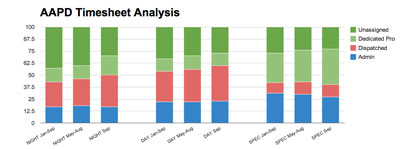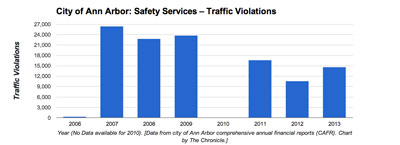Ann Arbor OKs Police OT for Traffic Enforcement
After 45 minutes of Ann Arbor city council deliberation, an additional $125,000 has been appropriated from Ann Arbor’s general fund balance to fund police overtime for traffic enforcement. The item had conceptually been described by Stephen Kunselman (Ward 3) as a $500,000 allocation, but he and co-sponsors Jane Lumm (Ward 2) and Jack Eaton (Ward 4) arrived at the conclusion that $125,000 would be a more reasonable amount to spend.
The additional money was allocated at the council’s Dec. 16, 2013 meeting on a 10-1 vote. Dissenting was mayor John Hieftje.
The three co-sponsors were part of a six-vote majority that had backed a significant revision to the city’s crosswalk law at the council’s Dec. 2, 2013 meeting. That change – which eliminated a requirement that motorists stop for pedestrians who were at the curb but not within the crosswalk – was subsequently vetoed by Hieftje. So motorists are still required to stop for pedestrians who are at the curb, even if they have not yet entered the part of the roadway marked as a crosswalk. The text of Hieftje’s veto was attached to the council’s Dec. 16 meeting agenda as a communication.
The debate on the crosswalk law featured support from all sides for the idea that enforcement was an important component of making the city safer for pedestrians and motorists. The resolution to fund additional police overtime came forward also in the context of increased concern among residents about motorists speeding on city streets.
Data from the city’s most recent comprehensive annual financial report (CAFR), compiled with previous CAFRs, shows that traffic citations have continued for the past three years at significantly lower levels than previously:
Some insight into the question of how much time AAPD officers have available for proactive policing activities – like traffic enforcement – has been provided to councilmembers in the form of timesheet data that officers have been logging since the beginning of 2013.
In the charts below (by The Chronicle, with data from the city of Ann Arbor), green shading indicates unassigned time and time dedicated to proactive policing activities. Dedicated policing activities include: bicycle patrol, business contact, check person, citizen/motorist assist, code citation, community event, community meeting, downtown foot patrol, extra patrol (general), extra patrol (parks), felony, impound, liquor inspection, misdemeanor, parking citation, property check, recontact, traffic enforcement (general), traffic enforcement (laser), traffic enforcement (radar), traffic problem, and traffic stop.

Ann Arbor police department timesheet analysis. AAPD provided a range of time periods, to cover for the data entry training period, as officers learned the new system and became accustomed to coding their activities in a standard way. (Chart by The Chronicle with data from the city of Ann Arbor.)
In a memo to the city administrator dated Nov. 4, 2013, chief of police John Seto indicated that he’s already begun to assign additional proactive duties to officers, based on the results of the timesheet analysis:
As a result of this data, supervisors and officers have been identifying additional dedicated proactive policing activities to engage in for the remainder of 2013. Staffing modifications will also be taking place for 2014. An additional officer will be assigned to Special Services to address traffic complaints. The distribution of Patrol Officers will also be modified to increase the number of officers assigned to the swing shift, where the volume of calls for service is greater.
With the 10-1 vote, the resolution achieved the eight-vote majority it needed on the 11-member council. Under the city charter, changes to the budget require an eight-vote majority.
For details about the council’s deliberations on this item, see The Chronicle’s live updates from the Dec. 16 meeting.
This brief was filed from the city council’s chambers on the second floor of city hall, located at 301 E. Huron. A more detailed report will follow: [link]




